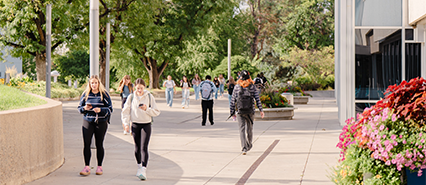Criminology, Bachelor of Arts & Science

Program Overview
Criminology examines the nature and extent of crime and criminality and society’s response to crime. We encourage students to think critically and creatively about what does and doesn’t work in current crime control efforts.
The program emphasizes the importance of research-based knowledge, theoretically informed practice, critical analysis, and ethical decision-making.
Students in the criminology program can specialize in their field of interest through concentration areas in community engagement.
Students engage in experiential learning through courses and in the internship program with placements in criminal justice, juvenile justice, victim advocacy, and community-based agencies.
Our program offers several learning formats. You can complete courses online or in a hybrid format with on-campus instruction. Criminology is also an external degree option through the Division of Extended Studies.
Program Admission"While pursuing my bachelor's degree in Criminology at CSU Pueblo, I truly felt a connection with my instructors and peers. My professors challenged me to think in ways that I never knew possible, and I could never thank them enough for that! CSU Pueblo allows students to grow and immerse themselves in the path of their choosing."
- Andrew Wurzbach, Criminology Student
Faculty Support Student Success
Faculty advisors and mentors work closely with our majors to develop programs of study based on their interests and career goals. Criminology students can earn up to 9 credits of upper-division coursework in the major doing field experience work in a wide variety of internship placements.
Advanced students may choose to conduct their own research projects with the supervision and guidance of faculty for course credit. There are also opportunities for students to conduct independent studies for credit with the sponsorship of one of our faculty members.
Five reasons to study Criminology
- You will master a range of transferable skills opening doors to a wide range of career options.
- You will gain an understanding of different points of view from the diverse students in our program preparing you to succeed in an increasingly diverse and complex world.
- Our students want to make a difference in their community and in others’ lives. The knowledge and skills you take away from the program prepare you to work in criminal justice and community organizations that provide prevention, education, and rehabilitation services to at-risk youth, juvenile and adult offenders, and crime victims.
- Criminologists help to shed light on the many reasons for rule-breaking behavior, examining how, social, cultural, economic, and political contexts contribute to changing definitions of crime and influence policing and sentencing practices across place and time.
- The study of crime is constantly changing as technological and scientific advancements bring about new types of crime and changing prevention and enforcement strategies A strong theoretical and research foundation informs best practices in a complex and shifting environment.
“There are crimes of passion and crimes of logic. The boundary between them is not clearly defined.” Albert Camus
Frequently Asked Questions
-
WHAT KINDS OF JOBS ARE AVAILABLE TO CRIMINOLOGY GRADUATES?
The criminology major prepares students to work in a wide variety of vocations including education, industry, government, business, and social service agencies. Many criminology graduates secure employment in youth services, drug rehabilitation, law enforcement, corrections, probation/parole, case management, victim services, and private security.
Students should keep in mind, however, that many employers are looking more for employees with a broad range of knowledge and a generalized set of proficiencies than they are for employees with a very focused and highly specific set of skills. Recognizing that labor force requirements change rapidly, many government departments, private organizations, small businesses, and corporations seek new employees who are open to novel ideas, adaptable to new situations, highly trainable, well organized, team players, committed to the task at hand, and effective at getting the job done. Such employers will assume that a graduate with a B.A. or a B.S., and an overall average approximating a 4.0 (A), will possess these qualities, regardless of their major.
-
WHAT IS THE DIFFERENCE BETWEEN THE B.A. AND B.S. DEGREES IN CRIMINOLOGY?
The criminology requirements for the B.A. and the B.S. are identical. The difference lies in the fact that the B.A. requires foreign language certification while the B.S. does not.
-
What are the Benefits of a Degree in Criminology?
Studying criminology will broaden your knowledge of the criminal legal system, policing in contemporary society, community corrections and rehabilitation programs or approaches as well as crime prevention efforts, and historical and current patterns of detention and mass incarceration. You will gain a better understanding of the development of the study of crime, historical and contemporary patterns of crime and victimization, the social etiology of criminality, social responses to crime, and the official crime control processes.
Criminologists combine theoretical and empirical methods to study crime and delinquency, including the manner in which offenders are processed. The functions and processes of the criminal justice system are studied by criminology students with an emphasis on the connections between these processes and various social institutions and organizations. Applying their theoretical and research knowledge, criminologists support and strengthen the work of law enforcement agencies, legal professionals, correctional facilities, treatment programs, and victim services.
-
HOW LONG DOES IT TAKE TO FINISH A CRIMINOLOGY DEGREE?
A criminology degree is designed to be completed in four years. The degree requires the accumulation of 120 credit hours. For students completing in four years, the schedule usually involves 30 credit hours per academic year or 15 hours per semester. Some students finish more quickly by taking additional courses in the summer. Others with demanding work or family commitments may take longer to finish.
-
WITH WHOM DO I CONSULT FOR ACADEMIC ADVISING?
Any member of the Department of Sociology, Criminology, and Anthropology is ready, willing, and able to advise all criminology majors. Consult the Faculty section of the website for department members’ phone numbers and email addresses.
-
WHO CAN I TALK TO ABOUT MY FINANCIAL AID OR BILL?
It is important to check your PAWS account regularly. Student Financial Services is open Monday-Friday 8:00 a.m. to 5:00 p.m. and is available via phone at 719.549.2753, email at financialaid@csupueblo.edu, and take walk-ins.
-
AM I QUALIFIED FOR SCHOLARSHIPS?
You may be qualified for one or more scholarships offered by CSU Pueblo. You must have an updated FAFSA on file with Student Financial Services. Visit the Scholarships page for more information.


